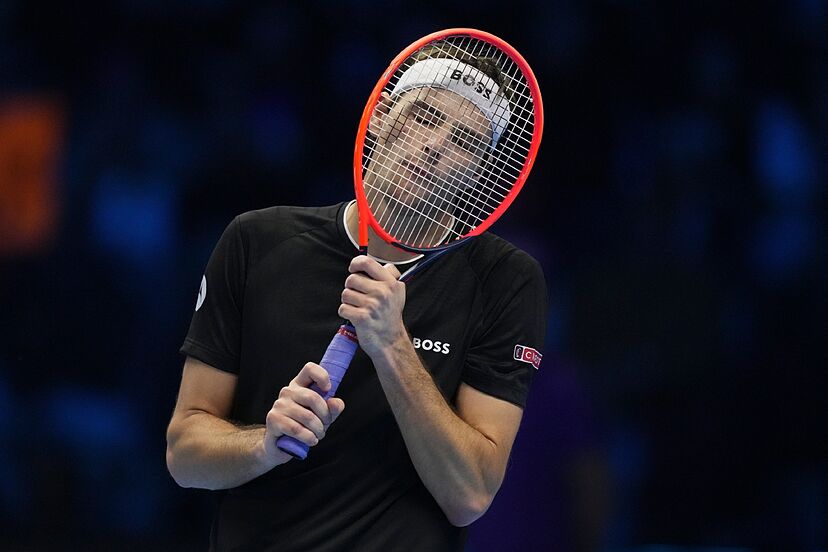Tennis has long been hailed as a sport of elegance, discipline, and integrity. Yet, beneath the glittering surface of Grand Slam trophies and standing ovations, the tennis world occasionally finds itself grappling with controversies that threaten its pristine image. Recently, one such storm has erupted, and at its center stands Taylor Fritz, the American tennis star who’s not afraid to voice his thoughts on doping scandals. To make matters even more intriguing, Fritz’s candid views have found unexpected support from none other than Patrick Mouratoglou, the renowned coach who has shaped the careers of some of tennis’ greatest legends, including Serena Williams.
A Rising Voice in Tennis
Taylor Fritz has steadily risen through the ATP rankings, becoming a beacon of hope for American tennis fans longing for a new champion. Known for his lethal serve and cool demeanor, Fritz has been carving out a name for himself as more than just a player; he’s becoming a voice of reason and responsibility in the sport.
Speaking at a recent press conference during the ATP Finals, Fritz didn’t hold back when asked about his thoughts on doping scandals in tennis. “It’s disheartening to see these stories surface,” Fritz began. “As players, we work so hard day in and day out to improve ourselves and stay within the rules. It’s frustrating to think some might be gaining an unfair advantage.”
The Context of Doping in Tennis
Doping is not a new topic in tennis, but it remains a sensitive one. The sport has seen its share of doping scandals over the years, from high-profile suspensions to murmurings of systemic issues. While tennis does not seem to be as plagued by doping controversies as some other sports, every scandal leaves a stain that takes time to wash away.
The debate over performance-enhancing drugs (PEDs) intensified recently after a handful of lesser-known players were sanctioned for anti-doping violations. Though none of these cases involved top-tier stars, the incidents reignited concerns about the effectiveness of tennis’ anti-doping protocols and whether enough is being done to ensure a level playing field.
Fritz’s comments resonate with many fans and players who are tired of seeing the sport’s reputation dragged through the mud. But what makes his stance particularly powerful is the endorsement it has received from Mouratoglou.
Mouratoglou Joins the Conversation
Patrick Mouratoglou is no stranger to controversies, but his track record speaks volumes. The French coach has been a key figure in the careers of top players like Serena Williams and Simona Halep, with a reputation for pushing boundaries in training and innovation. Mouratoglou has often spoken about the importance of integrity in sports, and this time, he’s standing alongside Fritz.
“I agree with Taylor,” Mouratoglou said during a recent interview. “Doping has no place in tennis. The sport is built on fairness and discipline, and we cannot allow any shadow of doubt to creep in.”
Mouratoglou went on to discuss the need for stricter enforcement and better education for players, especially younger ones entering the professional circuit. “Many players don’t fully understand the substances they’re putting into their bodies. The ATP and WTA must do more to guide them and ensure the rules are crystal clear.”
His comments echo a growing sentiment among the tennis community: it’s time to double down on anti-doping measures before the sport’s credibility suffers irreversible damage.
Balancing Transparency and Privacy
One of the challenges facing tennis authorities is the balance between transparency and privacy. When a player is accused of doping, their reputation is immediately at stake, regardless of whether the allegations are later proven false.
Fritz acknowledged this dilemma, emphasizing the need for fairness in handling such cases. “No one should be falsely accused,” he said. “At the same time, if someone is guilty, the consequences should be severe enough to deter others from making the same mistakes.”
His call for fairness reflects a broader need to protect the integrity of the sport without subjecting innocent players to public humiliation.
Learning from Past Scandals
The tennis world has learned valuable lessons from past doping scandals. The high-profile case of Maria Sharapova in 2016 remains a landmark moment in the sport’s history. Sharapova’s suspension for using a banned substance sparked heated debates about whether the rules were too harsh or too lenient.
Since then, tennis authorities have introduced stricter measures, including increased testing and more comprehensive education programs. However, Fritz and Mouratoglou argue that more can still be done.
“We need to send a clear message,” Mouratoglou asserted. “Players must know that the risks of doping far outweigh any potential benefits.”
The Role of Fans and Media
Fritz also touched on the role of fans and the media in shaping tennis’ culture around doping. He pointed out that while scandals grab headlines, the focus should remain on celebrating clean athletes and their achievements.
“The vast majority of players compete fairly,” Fritz said. “Let’s not let a few bad apples overshadow the hard work and dedication of everyone else.”
His words struck a chord with fans, many of whom have taken to social media to express their support for the American star’s stance.
Looking Ahead
As the tennis world prepares for a new season, the conversation around doping will undoubtedly continue. Fritz’s willingness to speak out, coupled with Mouratoglou’s support, marks a pivotal moment in the sport’s ongoing battle against PEDs.
For Fritz, the issue is about more than just winning or losing; it’s about preserving the essence of tennis for future generations. “This sport has given me so much,” he said. “I want to ensure it remains a fair and inspiring game for everyone who loves it.”
Conclusion
Taylor Fritz’s outspoken stance on doping scandals has sparked a much-needed conversation in the tennis world. Backed by Patrick Mouratoglou, his call for stricter enforcement and greater education is a rallying cry for integrity in sports.
As fans, players, and authorities reflect on his words, one thing is clear: the fight against doping is far from over. But with voices like Fritz’s leading the charge, tennis has a strong ally in its quest to remain a bastion of fairness and excellence.
The road ahead may be challenging, but the message is undeniable: there’s no room for shortcuts in a sport built on hard work, talent, and integrity.


